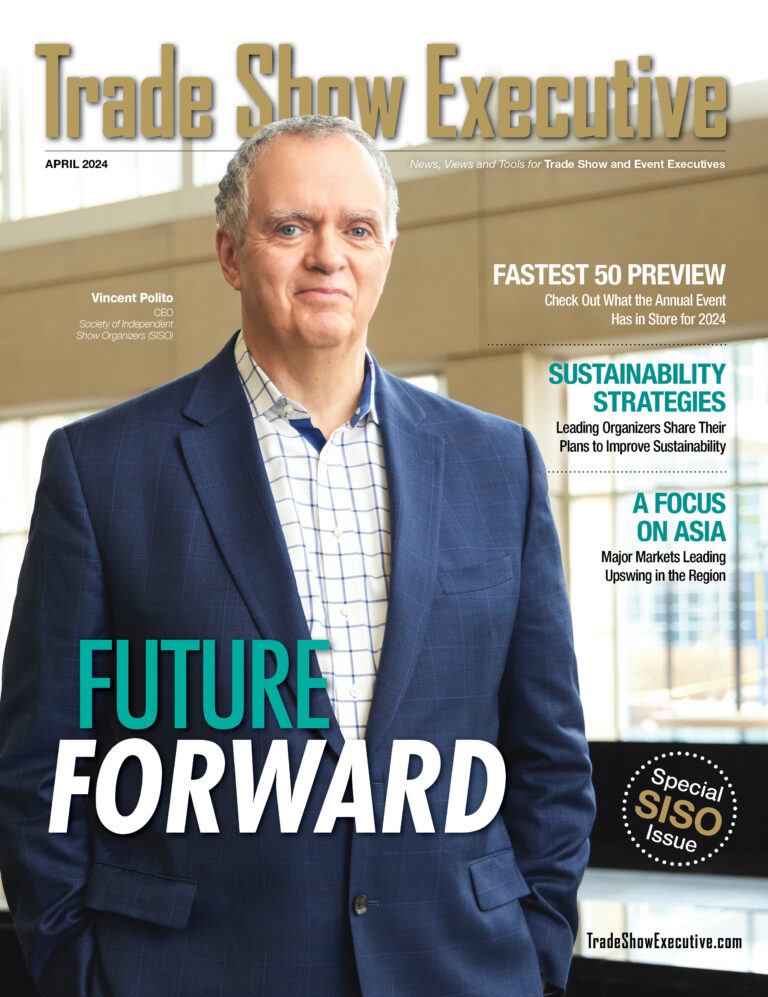Global Direct featured five sessions addressing a wide variety of topics about producing shows outside the U.S. – everything from “Global Safety and Security Concerns” and “Successful Global Business Models,” to “Prepping Your Exhibitors For International Shows” and “Best Practices in Marketing Shows Outside the U.S.” TSE identified 10 key takeaways.
- Brand consistency is key. IAAPA has found success by its expanding its trade shows into Europe and Asia. “For the consistency of our brand, if we do shows outside the US, the events have to be owned and managed by IAAPA,” said Ryan Strowger, Chairman of the International Association of Exhibitions and Events and Senior Vice President, Exhibitions, Conferences and Sales for the International Association of Amusement Parks and Attractions. Despite the fact that IAAPA has opened offices in Mexico, Belgium and Hong Kong, “we still rely heavily on local partners for decorating, registration, working with government authorities for regulations and more,” he said.
- Boots on the ground. “We prefer to have boots on the ground to manage the business and brand, but we don’t have offices in every city in the world,” said Tom Cindric, Senior Vice President, Informa Global Exhibitions, who has spent the last 15 years expanding brands like World of Concrete globally. “We worked with joint-venture partners to launch in Mexico and India. We launched on our own in Shanghai, but we have Informa offices there.”
- More = More. Some U.S. show organizers are concerned international events will cannibalize their U.S. trade shows. “We were concerned, but we have not experienced that yet,” Strowger said. “We are vigilant and intentional about making sure each event has a unique theme. Many exhibitors participate in more than one event, and about one-third of Asia exhibitors participate in all three IAAPA shows.
- Act local, be local. “It’s not a cookie-cutter approach when taking your brand outside of the U.S.,” said Jason McGraw, Senior Vice President, InfoComm International. “Be sensitive to local customs. For us, local advisory groups have been successful.
- Picking the right partners. “You need to understand the culture and know your partner is someone you can trust,” said Tony Calanca, Executive Vice President, UBM. “It’s difficult to determine in one week of meetings with potential partners who you can trust. We have failed a lot. You can’t do it from the States. We are very leery to launch international event without offices in the country.”
- Think the language. When it comes to marketing, don’t just translate your ads into the local language, said Aloysius Arlando, CEO, Singex Holdings. “It’s important to think the language to determine the right messaging for the local market.”
- Person-to-person marketing. For its Automechanika brand, Messe Frankfurt has launched 15 shows in 14 countries. “We did a road show to local and regional chambers and business associations to present the concept and brand before the launch,” said Dennis Smith, President & CEO, Messe Frankfurt USA. “Word of mouth is so powerful.”
- Online-to-offline. Shows in Asia are building communities using platforms like WeChat and What’sApp. “How can shows enhance face-to-face with these digital platforms?” asked Aloysius Arlando, CEO, SingEx Holdings. “Is it an app or something else? Everyone is trying to crack the code, but no one has yet. UBM is partnering with Alibabi in Asia to enhance its O2O opportunities.
- Data beware. “Despite greater opportunities to learn more about attendees through data, keep in mind data protection laws differ by country. Europe is stricter than the U.S.”, said Jason McGraw, Senior Vice President, InfoComm International. Canada is currently in the process of adopting new laws. In Asia, you must have opt-in not opt-out.
- Mitigating risk. “Terrorism is obviously the toughest risk to mitigate,” said Richard Mann, Director, Business Development, The NEC in Birmingham, U.K. “The venue has plans and protocols in place, but no one can be 100% secure. Emergency protocols and procedures evolve and are constantly being enhanced.” To make sure everyone is prepared in the event of a crisis, “repeat, repeat, repeat,” said Michael Kruppe, General Manager, Shanghai New International Expo Centre.
Read more about Global Direct in the August issue.











